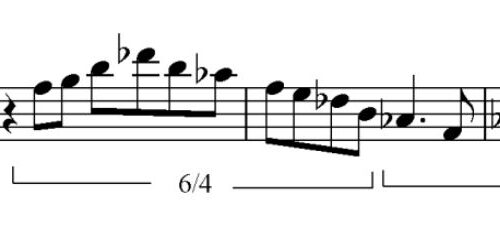Continuity of Conception
 In the last post Bill Evans Explained Part 2, we were discussing the groundbreaking solo “Re: Person I Knew”. The hallmark of that solo and many others is the continuity of Bill’s conception. As he explained previously, “…he has a reason for every note he plays.” Evans ponders carefully the concept he is using when recording, often working out specific details meticulously between takes. Tony Bennett talks about it in this video in their collaborations with Bill in the 70’s (around 3:58 in).
In the last post Bill Evans Explained Part 2, we were discussing the groundbreaking solo “Re: Person I Knew”. The hallmark of that solo and many others is the continuity of Bill’s conception. As he explained previously, “…he has a reason for every note he plays.” Evans ponders carefully the concept he is using when recording, often working out specific details meticulously between takes. Tony Bennett talks about it in this video in their collaborations with Bill in the 70’s (around 3:58 in).
The first level of continuity happens at the tune execution level. How is the tune arranged and how does the solo spring forth from that? Many piano players make nice arrangements but there is often a sense of artificial division between the tune and the solo (i.e. “now I’m doing the head”, “now I’m doing solo”). With Evans you don’t feel that. Alfie from Montreux II is a great example of this fully conceived composition that is both arrangement and solo – essentially the full experience of the tune as a jazz piece. The solo is so memorable and integrated that it feels like it is part of the song. Is this planned out? Of course it is. But somehow Evans manages (at least most of the time) to make what is planned feel present and alive. I think it is because he thinks of his tune arrangements as structures (referred to in the famous interview with Marion McPartland). With this he is able to wriggle variations here and there to keep it fresh while still maintaining the integrity of the strong structure he has built for the tune. He also has this knack for making subtle substitutions and fills to the melody making it an “instrumentalized” reconstruction of the original melody giving it the weight and integrity of the original but yet the freedom and melodicism of an improvisation. He has played the tune with similar figures and arrangement on other occasions but this one by far is the most deeply felt and perfect. It may be the most perfect rendition of a ballad I have ever heard.
“Show Type (Tune for a Lyric)” from 1962 is one of my most favorite performances of Bill. The tune has a wonderful introduction, a great head, remarkable solo and really surprising ending with dark chords and locrian scales. One of the real achievements is the orchestration. There is a building of energy that results from the quiet etude-like feeling of the intro and the pairing down of the solo texture to single note right hand playing with the bass walking in two in the 1st two choruses. The energy builds gradually until Bill comes in at the top of the 3rd chorus comping strong, coinciding with the bass changing to 4/4 walking. It’s as if a 4th player stepped in. His last chorus takes up a final notch with his virtuoso block chords making him sound like a big band. (Bill is likely the best solo block chorder ever). So Bill is bringing out the maximum effect of the song by pacing himself perfectly, managing the tune’s mini-form (intro, solo subsections, head out and coda) orchestrational density (solo sans left hand, solo with comping then full block chords) and intensity (both dynamic and rhythmic). This is just speaking of the presentation and execution. From a melodic perspective there is equal continuity in his solo. It is also one of the hardest swinging Bill I have ever heard. It stacks up against any other hard swinging pianist I have heard plus there is everything else on top of that.
Even when Bill is not so tidy he still has continuity. No one else can work a motivic idea so deeply and not end up sounding irritating. This goes for many jazz pianists I hear today. They often go off and develop something in hyper-detail only to leave me asking, “Ok, but why?” “Solar” from the Village Vanguard ’61 recording is amazing in this immersion into conception. When I saw the tune listed on the record I was expecting more of a bebop thing to happen but instead I was delivered something entirely different – a listening experience. Essentially it is a study in two handed octaves and triplet motion. It works the idea enough to be compelling but not too much to be overdone. There is no mistaking Evans superimposition of the quarter note triplet in his solos. The rhythmic groupings of his graduate to a personality trait not an exercise. It is like a study of rhythmic energy that circles, moves forward and backward.
This attention to detail even extends to apparent mistakes. Occasionally, Bill plays a flub but because he has so much integrity he takes the mistake and tries to iron out a reason for it and create themes out of it after the fact. In my view he does that in “Come Rain or Come Shine” where he plays a little crushed note flub at 1:40 and then follows it with a series of answers and motives that kick start the solo to a higher energy level that make the solo even more compelling.
I think to a degree Evans could almost be at war with himself as to his attention to detail side and his spontaneous compositional ability throughout his career. It could be argued that he became too programmatic as his career progressed. He definitely was a conservative – musically speaking. He had certain places he wouldn’t go simply because they were not “him”. So to that degree he was reserved and controlled. He was not capricious because this was at odds with his artistic sense. But he knew who he was very clearly. He knew that if he were to go down an avenue that felt wrong he would be stuck with it later. And he could often be attacked for that by critics who were looking for the “latest and greatest”. As he told Marion, “I have to play what pleases me.” No one can plan a more cohesive arrangement from start to finish than Bill while at the same time when confronted with something a little different than planned or out of the norm no one could create something so brilliant (as evidenced by “Solar” above). He, to coin a term I use often, invented within restriction. This idea gives an improvisation that continuity and structure while still maintaining a beating heart. No one could every accuse Bill of sounding bloodless, certainly.
